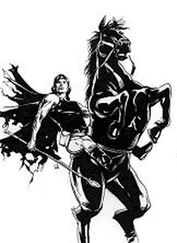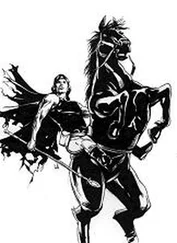Jack Chalker - Priam's Lens
Здесь есть возможность читать онлайн «Jack Chalker - Priam's Lens» весь текст электронной книги совершенно бесплатно (целиком полную версию без сокращений). В некоторых случаях можно слушать аудио, скачать через торрент в формате fb2 и присутствует краткое содержание. Год выпуска: 1999, ISBN: 1999, Издательство: Del Rey / Ballantine, Жанр: Фантастика и фэнтези, на английском языке. Описание произведения, (предисловие) а так же отзывы посетителей доступны на портале библиотеки ЛибКат.
- Название:Priam's Lens
- Автор:
- Издательство:Del Rey / Ballantine
- Жанр:
- Год:1999
- ISBN:0-345-40294-4
- Рейтинг книги:3 / 5. Голосов: 1
-
Избранное:Добавить в избранное
- Отзывы:
-
Ваша оценка:
- 60
- 1
- 2
- 3
- 4
- 5
Priam's Lens: краткое содержание, описание и аннотация
Предлагаем к чтению аннотацию, описание, краткое содержание или предисловие (зависит от того, что написал сам автор книги «Priam's Lens»). Если вы не нашли необходимую информацию о книге — напишите в комментариях, мы постараемся отыскать её.
Priam's Lens — читать онлайн бесплатно полную книгу (весь текст) целиком
Ниже представлен текст книги, разбитый по страницам. Система сохранения места последней прочитанной страницы, позволяет с удобством читать онлайн бесплатно книгу «Priam's Lens», без необходимости каждый раз заново искать на чём Вы остановились. Поставьте закладку, и сможете в любой момент перейти на страницу, на которой закончили чтение.
Интервал:
Закладка:
“Is that why you never went back to your shuttle?” Barbara asked her.
“Oh, we did. Not right away, of course, but a couple of years later, when we managed to get real beach access and test the dugout canoes. Thing was, we couldn’t get in the damned thing. That claustrophobia again, you see. And then we got to thinking, that even if we forced ourselves in, even if we took some of the organic drugs and maybe knocked ourselves out for the trip, where would we wind up? In a little room on the little moon, and then to a little enclosed shuttle, and—well, you see? We couldn’t do it. Wouldn’t have mattered anyway. By then—two, three years—we had a couple of kids. Couldn’t leave ’em, and we couldn’t really take them into that environment when we weren’t sure we wouldn’t go crazy. That kind of settled it.”
They nodded. It was consistent with the behavior several of the survey teams had monitored, and now, coming from someone familiar with the outside universe, it made sense.
“So you stayed and you built all this,” Barbara said, looking around.
“Yeah, eventually we solved the serious problems. It rains a lot in this place, so we dug out those big cisterns and lined them with a clay that proved pretty waterproof and we’ve never been without fresh water. About five years ago we found a kind of forest stalk that’s pretty big but hollow inside, and, sealed with clay, it actually works well as a pipe. Now we got running water and a basic system for getting rid of waste. A lot of the kids are pretty clever, too. They’ve been coming up with stuff. We’re actually building a new kind of society here. It’s different, it’s not evolving anything like what I grew up with, but it’s a good society. You know we’ve never had a murder here? There’s virtually no crime at all. The Hunters, poor devils, have been pretty well wiped out. When we run across a possible survivor or the result of some other sick Titan experiment, we put them out of their misery. Otherwise, there’s little in the way of violence. You feel safe and secure here. There’s plenty of food, the climate’s good, and these kids have never really known want or fear. If somebody, even a stranger, comes, they’re welcome, as you are, to anything we might have and free to help out or go along.”
“Any regrets?”
“Oh, a few. I spent some time feeling really miserably sorry for myself, until I suddenly realized that I was crying over missing very superficial things when I had what was really important right here. Good kids, good friends, and a lifetime to study and see how a new society develops. One of these days, maybe, I’ll record it all. If not, somebody else will come, maybe from my old school, and critique us. My old mentor led off a lecture, once, on primitive cultures and societies by cautioning against prejudgment. He said that we measure our progress by the wrong things, by whoever has the most things at the end of life. That people spend their lives, whether part of an interstellar civilization or hunting wild boar in the rainforests with a spear, searching for something of value. That something is different for almost every individual, and impossible to define, but you know it when you see it, you know it when you have it, and you know it if you’ve lost it. Most people at the end of their lives never do have it. Now look around. This is mine.”
They let that stand, unable to think of anything to say in reply. Finally, Barbara asked, “Where is Mister Harker? You said he was the other survivor.”
“Gene? Oh, yes. In one way he agrees with me on this, but for many, many years he was still missing something, and he had this maniacal drive to have it no matter how long it took and no matter how many tools he had to reinvent. Well, he’s had it now for a while, and there’s few days when he doesn’t revel in it. I like it now and then, but it’s not really a part of my satisfaction in life.”
“And it is…?”
She pointed out to the sea. “There he is now! You can see him just on his way in from the islands!”
They both turned, and gasped almost in unison. Still a way out, but heading in, was a sleek and sexy sailboat. A distant figure on board was just trimming the sails to let the tide carry him in the rest of the way.
“He built that? With what you have here?” Assad was almost speechless.
“Indeed he did. He and a lot of the others here, anyway. He did it without computers, without blueprints, although he did use designs he baked in clay, and had to fashion and perfect out of stone and salvaged bits of metal and whatever all the tools required. He also had to wait until enough kids were old enough to help him build it, too!
Now he’s out there half the time with two or three grand-kids. He’s too old to do it, but he swears he’s going to sail it all the way to the other continent someday. I told him I knocked him cold once for turning into an idiot and I can damn well do it again!”
Barbara looked at the beach below. “I thought there were some kind of sea monsters that burrow under the sands,” she noted. “Why don’t they pose a danger to your men and boats?”
Kat laughed. “Oh, when I first came ashore I panicked at those things! I got hysterical with fear! But when you find out how to detect them before they detect you, and you have good enough spears and maybe mallets to drive them in, you wind up getting them before they get you. You know—they taste pretty damned good, if you’re willing to spend enough time with enough people digging ’em out. We don’t see many of ’em anymore. We think maybe either they know better than to come up here or maybe we’ve eaten the whole damned local population.”
“Then—it’s safe to go down there and meet him?”
“Oh, sure. Take a couple of the boys with you just in case, but you won’t have problems.”
It was a long walk along the cliffs until they came to a place where the land dipped. Into that spot somebody, maybe the four from the original expedition, had carved well-worn steps that switched back all the way down to the beach.
“We have to carve a new set every year or two. They wear away, even if you coat ’em with clay,” Curly told them. “It’s no big deal. It’s soft, mostly salt, and if it gets too dangerous it’s not that far until there’s another dip almost down to beach level.”
They needn’t have worried about going down to a potentially dangerous beach alone. It seemed like half the kids followed them, mostly gawking, and a lot of the older ones as well.
More than once they were asked why they had sails on their bodies, and they realized that these people had never even seen folks wearing clothes. The best they could manage was, “Well, not all the places are as nice as this, and in many you need protection or you will get hurt.”
They waited a bit for Gene Harker to come in. He came in fairly fast, with all sails struck, and rode the sailboat right up onto the beach. Children rushed to take thick ropes and drag it out of the water. Then the young kids who were the passengers jumped out first, and, finally, the old man.
Gene Harker also looked very good for his age, but he was white-bearded, and what hair still on his head was snow white as well. Still, he had those same unusual blue eyes that had always made him stand out to the ladies.
He did one last check and then jumped down to the sand with an “ Oomph!” He straightened up, and only then saw the two uniformed people waiting for him. He stopped a moment, squinted, then walked forward and stared right at Barbara.
“Holy shit!” he exclaimed. “Is that you, Fenitucci?”
And, to the very last one, all the others on the beach suddenly shut up, turned, and said, as one, “ That’s Bambi the Destroyer?”
Читать дальшеИнтервал:
Закладка:
Похожие книги на «Priam's Lens»
Представляем Вашему вниманию похожие книги на «Priam's Lens» списком для выбора. Мы отобрали схожую по названию и смыслу литературу в надежде предоставить читателям больше вариантов отыскать новые, интересные, ещё непрочитанные произведения.
Обсуждение, отзывы о книге «Priam's Lens» и просто собственные мнения читателей. Оставьте ваши комментарии, напишите, что Вы думаете о произведении, его смысле или главных героях. Укажите что конкретно понравилось, а что нет, и почему Вы так считаете.












